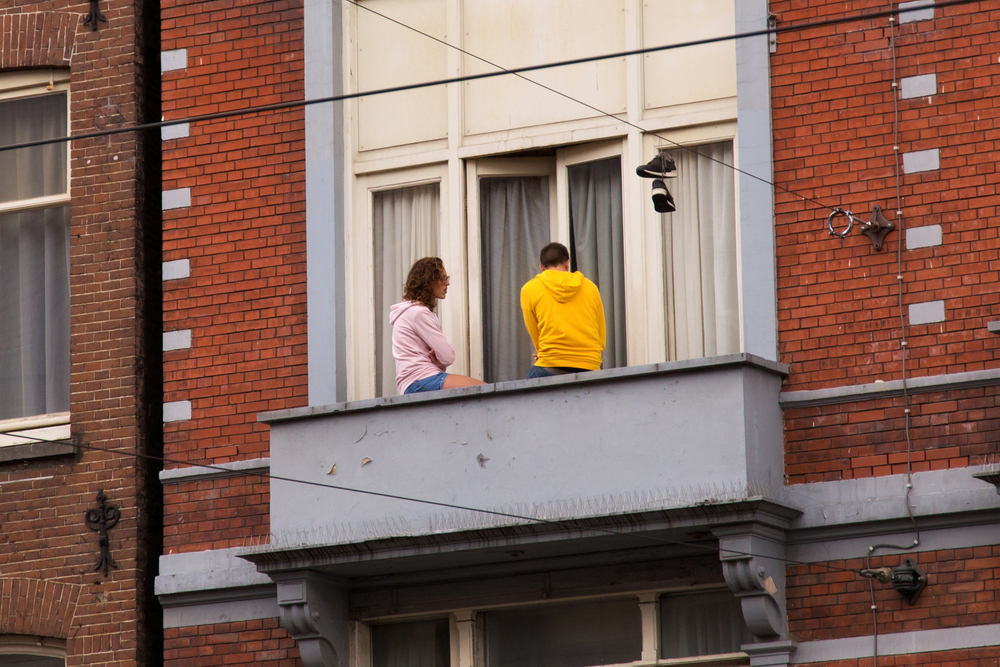Moving to the Netherlands is a process full of excitement, anticipation, and nerves.
However, it’s often not until you’ve arrived that the real challenges appear. Are you prepared for Dutch directness, the housing crisis, and public transport?
If not, you will be soon! We sat down with Calvin, relocation expert and co-founder of Jimble, to chat about the most common challenges internationals face when moving to the Netherlands — and how you can overcome them.
What challenges are we talking about? Well, there sure is a lot to choose from, but let’s focus on integration and navigating the Dutch way of life — so you’ll feel at home in the Netherlands in no time. 🙌
READ MORE | 9 top tips to help you fit in in the Netherlands
Settling in: managing expectations for life in the Netherlands
One of the first things that came up in our call with Calvin was the importance of managing expectations when relocating to the Netherlands.
Sure, you might think “but I have registration to do and documents to print!” While those things are important, Calvin emphasised that to have a successful relocation, it’s crucial to think about what makes your everyday life enjoyable to you.
After all, the actual moving process is quick, while the post-arrival phase is what will shape the rest of your life here.
Did you know? One of the main reasons for failed expectations when moving to the Netherlands is the Dutch housing market. Many internationals are used to bigger houses with better locations for, well, half the price of a standard Amsterdam apartment.
To overcome the challenge of finding your footing in the lowlands, Jimble offers a wealth of settling-in services.
As Calvin walked us through the relocation process with Jimble — from initial call to neighbourhood orientation after move-in day — he highlighted the biggest considerations for internationals in the Netherlands.
Questions to ask yourself when relocating to the Netherlands
So, what happens after the big decision to start a life in the lowlands? You might have pictured yourself sailing along the canals of Amsterdam, drinking Heineken on a terrace, and kicking back with a Dutch show on Netflix.
Before all that, however, you need to consider visas (if applicable), what city you’ll plant your new roots in, and whether you need to take a Dutch language course in preparation for work or school.
Along with these basics, hopefully, you’ve already:
✅calculated your budget,
✅thought about what area you would like to live in,
✅and taken commuting time into consideration.
But have you also considered what trade-offs you’re willing to make for having green areas near your home, quality supermarkets, or being within walking distance to your favourite gym?
Calvin told us that the small everyday things that make life sweet are often what people forget to think about during the relocation process.
“You’ve been living with these things for the past many years, so it doesn’t immediately pop up in your mind.”
In other words, it’s easy to take for granted what you have back home and consequently overlook them when settling in in the Netherlands — unless you have an expert like the team from Jimble to help you. 🙌
Dutch directness: combatting communication difficulties
One thing we can’t beat around the bush about is Dutch directness. Infamous for their plain speaking, Dutchies won’t sugarcoat what’s on their mind.
Nor will you have to second-guess if a compliment was just meant as politeness — it can be pretty refreshing, to be honest.
While Dutch directness can sometimes hit you like a slap in the face, it is also one of the most misunderstood things about Dutch culture.

So how can you overcome the initial shock of Dutch directness? The team from Jimble says to take it in your stride.
“Remember not to be offended at what you may hear. It’s not meant to be mean but just to give you a very honest opinion or statement about something.”
Trust us, Dutch directness is one of the cultural differences that you may even learn to love and admire. 🎉
Other communication challenges in the Netherlands
However, something that may take longer to get used to is communication with Dutch authorities and service providers.
When it comes to housing, utilities, taxes, healthcare (and all the other jazz you need to sustain life in the 21st-century, really 🤷♀️) it can come in extra handy to have a company like Jimble help you with the communication.
Why? Because while Dutchies are some of the best non-native English speakers in the world, most of the correspondence with authorities and service providers is still in Nederlands.
Tip: Some libraries and international centres (especially in larger cities) help translate your letters from the Dutch government to English. Though not always an official service, you can always ask if they have language volunteers willing to assist!
So, save yourself the headache — and frantic Google Translate searches — and let Jimble take care of any official documents you need translated.
Plus, they’ll educate service providers on how to cater to international clients (like you) so more documents will be in English in the future!
The housing crisis: understanding the Dutch housing market
As mentioned, one of the biggest reasons for failed expectations during relocations to the Netherlands is the dreaded Dutch housing market. Over the past years, supply has sunk, prices have spiked, and landlords have gotten pickier. (A deadly triple-threat, if you ask us).
So, how do you lock down your dream home in the Netherlands? Jimble can help overcome this beast of a challenge by briefing you not just on the housing market but also on how to make a good impression on a potential landlord.
Calvin explained that Jimble maintains good relationships with Dutch real estate agents, negotiates contracts, and helps you secure a home in the fast-moving market by getting all the necessary documents ready in lightning time. 🏃♂️

If you, on the other hand, are navigating the housing market on your own, well, then brace yourself for a bumpy ride.
It’s by no means impossible to find a home in the Netherlands without expert help, but you might just want to lower your expectations a tad. The market moves fast so the best thing to do is to be persistent, patient, and proactive — success! (good luck!).
Bikes and public transport: navigating Dutch transportation options
Okay, so far the most common challenges have been of manners and the mind.
However, there is also a very physical challenge (asides from moving your large furniture to the third floor of a canal house), namely, mastering the Dutch public transport system.
READ MORE | 7 ways you can level-up your Dutch life with a personal OV chip card
With a smiling disclaimer that it often depends on where people are from, Calvin told us that Jimble often talk to internationals who are worried about traffic safety in the Netherlands.
“Many have preconceived notions that cycling in the Netherlands is dangerous and that public transport is dirty and often delayed.”
However, while almost every Dutchie has a love-hate relationship with the NS, public transport in the Netherlands tends to be very punctual and clean.
Expert tip: Calvin recommends using the public transport app 9292 to stay updated on your journey. 🚆
Moreover, the Netherlands isn’t a famous cycling country for nothing. Although Dutchies might not be big on helmets, their cycle lanes are separated from the main roads and cars are attentive to cyclists — who pretty much own the road in any major city. 💁♀️
So, hopefully, this has given you the courage to tackle Dutch public transport head on! Dat zit wel snor! (“That sit well moustache” a.k.a, you’ve got this!).
Municipal taxes: getting a grip on water, waste, and road taxes in the Netherlands
Alright, you’ve overcome Dutch public transport to arrive home to a windowed envelope in your mailbox — helaas (pity).
While paying taxes is one of those adulting tasks that just has to be dealt with, the extra paperwork (and especially in a foreign language) is a burden in the midst of an already busy relocation process.
Unfortunately, there’s no way to get around it. So, employ the help of (trusty??) Google Translate or better, ask a neighbour or friend with a high level of Dutch to help you!

If you’re stressed, don’t feel comfortable asking a friend, or simply want a better understanding of which taxes you’re paying, then contact the experts from Jimble. They’ll happily walk you through the various taxes in the Netherlands — from income to municipal.
While Calvin said that many internationals are pleasantly surprised about Dutch taxes, he emphasized that where a lot of people get lost when it comes to water consumption versus water tax. For the record, they’re two different things. 😉
But hey, that’s what we get for living in a country that’s below sea level. 🤷♀️
The Dutch medical system: seeing a GP in the Netherlands
Along with taxes, having a GP as well as health insurance is one of those things that’s important but overwhelming to sort out in a new country.
And to be completely honest, while the Netherlands has an excellent medical system, it can be hella hard to navigate as an international.
If you’re ready for the challenge of finding a GP yourself, ask your international colleagues, neighbours, or classmates how they registered with a GP and if they can recommend a Dutch doctor’s office near you.
Or, to make things easier, Jimble can give you a list of options for General Practitioners (huisarts) in your area as well as dentists and hospitals. Plus, their experts will also guide you through the process of registering with a doctor’s office near you.
Relocating as a family: organising childcare in the Netherlands
You’ve tackled expectation management, dealt with Dutch directness, and overcome transport, housing, and tax challenges. Plus, you’ve found a Dutch GP. Way to go! 🎉
Now, it’s time to get those kiddos to school.
Sounds easy, right? If only. Though delivered with a laugh, Calvin was serious when he said that “you need to have two to three daycares lined up before the baby comes out of the oven.” 🥲
He continued: “In the Netherlands, you can’t just go around and shop daycares or schools like in other countries. Instead, there are different options also depending on how many days a week you want your child(ren) in daycare.”
The common denominator for all daycare options though? They come with a hefty price tag. 😬
Expert tip: Sadly, there’s no shortcut to organising childcare in the Netherlands. However, Calvin advises:
- Sign up as early as possible and have a couple of backup options in case your first priority falls through
- If you’re staying in the Netherlands long-term then find a daycare that’s linked to a school. That way, it’s easier when your child graduates from daycare to school.
- Prioritise what works best for your family. Daycare in the Netherlands can cost as much as one parent’s salary, however, the cost can be cheaper outside of the large cities.
- Finally, daycare centres are more likely to select you if you opt for more days out of the week or put multiple kids in the same institution.
As you can see, with a little help from some relocation experts, the challenges of moving to the Netherlands are easily overcome. 😍
Ready to make your relocation process a whole lot simpler? Contact Jimble to find out more about their specialised services for internationals in the Netherlands.
Can you recognise these challenges? How did you overcome them? Tell us in the comments below!
Feature Image: Krakenimages.com/Depositphotos